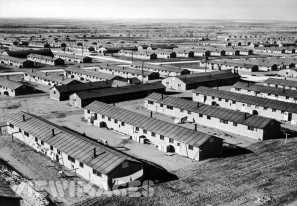Joe Biden elevates Colorado WWII Amache Japanese-American prison camp as federal historic site
President Joe Biden on Friday signed into law a bill backed by Colorado lawmakers to re-designate the Amache prison camp, where thousands of Japanese Americans were held during World War II, as a federal historic site managed by the National Park Service.
This is expected to boost funding for preserving, protecting and interpreting Amache National Historic Site ruins, located in southeastern Colorado at Granada, where high school students for years have served as volunteer caretakers and created a museum.
Sen. John Hickenlooper went to the White House Oval Office Friday afternoon for the signing.
“One thing that has occurred to me as the invasion of Ukraine continues — and let’s say Russia escalates it and we actually do get into some higher level of conflict — I like to think we’ve learned a lesson from the incarceration of 120,000 Japanese-American citizens during World War II and that we would not start setting up prison camps for Russian-American citizens,” Hickenlooper said in an interview.
Japanese-American survivors of Camp Amache, officially called the Granada War Relocation Center, applauded the re-designation.
“This is the day we’ve been looking for for years,” said Carlene Tinker, 82, who was held at Amache from 1942 to 1945. “It’s a testament to those who were in the camps. It’s an apology by the government — long overdue. I am so happy for this passing.”
Last month, senators unanimously approved the Amache National Historic Site Act legislation to preserve Amache, the smallest camp in the national complex that held those 120,000 Japanese Americans during the war after Japan’s Dec. 7, 1941, bombing of Pearl Harbor.
President Franklin Roosevelt on Feb. 19, 1942 ordered the incarceration of Japanese Americans and a War Relocation Authority forced them from homes around the western United States. U.S. authorities held them — most of them U.S. citizens — at 10 camps in California, Arizona, Wyoming, Utah, Arkansas and Colorado. At Amache, roughly 7,000 were held between 1942 and 1945. President Ronald Reagan in 1988 signed a Civil Liberties Act that included a formal apology and paid $20,000 compensation to each of about 100,000 survivors.
Camp Amache was named after the daughter of a slain Cheyenne chief.
Colorado’s Democratic senators Michael Bennet and Hickenlooper drove the legislation in the Senate. Republican U.S. Rep. Ken Buck and Democratic U.S. Rep. Joe Neguse introduced companion legislation that they pushed through the House of Representatives.
Now National Park Service officials are required to develop a management plan, including a map showing boundaries that do not interfere with current activities. The site covered roughly 10,000 acres, now used mostly for agriculture, with barracks on less than 640 acres — to be donated by the town of Granada to the federal government. Park Service crews are expected to establish administrative, visitor service, and curatorial facilities at the site.
Federal agency officials didn’t respond to queries on Friday.
“This moment stands on the shoulders of giants — the Amache survivors who, with incredible generosity and strength, have waited for this day for so long, and who now will never be forgotten,” said Tracy Coppola, a Colorado program director with the National Parks Conservation Association advocacy group.
Granda High School students plan to continue with their historic research and running a museum at Amache, said dean of faculty and history teacher John Hopper, who has led student work at the site including investigations detailing wartime deprivations of civil liberties.
“The story needs to be told so we don’t repeat a wrong,” Hopper said in a recent interview.
“It was wrong then. And it is wrong now. Hopefully, preserving sites like this will teach our youth, our future leaders, that it is wrong.”
Source: Read Full Article


